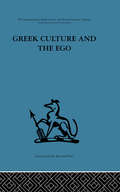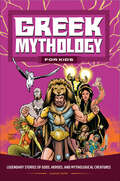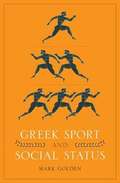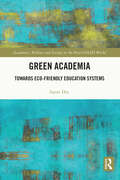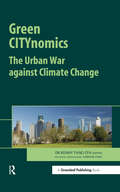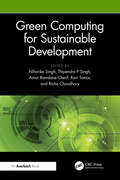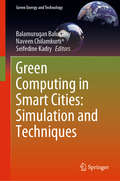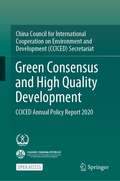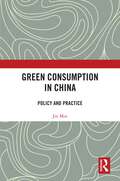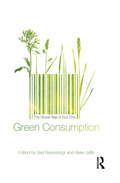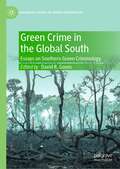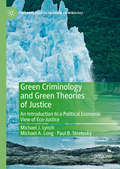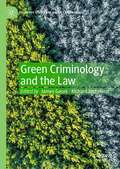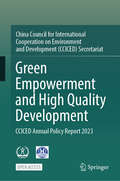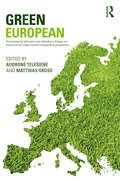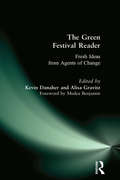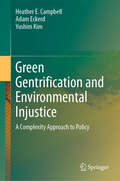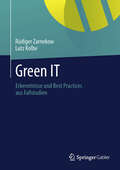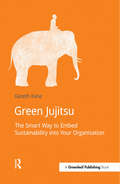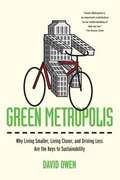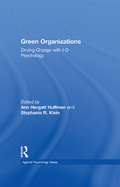- Table View
- List View
Greek Culture After the Financial Crisis and the Covid-19 Crisis: An Economic Analysis (The Political Economy of Greek Growth up to 2030)
by Panagiotis E. Petrakis Pantelis C. Kostis Dionysis G. Valsamis Kyriaki I. KafkaThis book studies the evolution in human thought, action, and behavior as a result of the 2008 fi nancial crisis and the Covid-19 crisis. Through the presentation and analysis of data, as recorded for at least a decade, and using the Greek economy as a case study, the authors examine the changes in social and human capital, increasingly risk-averse behavior, and changes in people’s general psyche and economic action in Greek society and economy.
Greek Culture and the Ego: A psycho-analytic survey of an aspect of Greek civilization and of art
by Adrian StokesTavistock Press was established as a co-operative venture between the Tavistock Institute and Routledge & Kegan Paul (RKP) in the 1950s to produce a series of major contributions across the social sciences. This volume is part of a 2001 reissue of a selection of those important works which have since gone out of print, or are difficult to locate. Published by Routledge, 112 volumes in total are being brought together under the name The International Behavioural and Social Sciences Library: Classics from the Tavistock Press. Reproduced here in facsimile, this volume was originally published in 1958 and is available individually. The collection is also available in a number of themed mini-sets of between 5 and 13 volumes, or as a complete collection.
Greek Mythology for Kids: Legendary Stories of Gods, Heroes, and Mythological Creatures
by Zachary HambyWhether you're fighting alongside Zeus in the war against the Titans or witnessing the sabotage of Artemis's love for the mortal Orion, this Greek mythology book for kids 8 to12-year-olds will thrill with extraordinary stories from Greek legend! Greek gods and goddesses continue to capture our imaginations with tales of epic battles and star-crossed love. Experience adventure and enchantment with this book about Greek mythology.Greek Mythology for Kids has it all:Classic characters—Dive into 20 exciting, kid-friendly tales featuring the antics of favorite characters like Aphrodite, the goddess of love, Hermes, messenger of the gods, and Persephone, queen of the underworld. Dramatic illustrations—Watch the awe-inspiring world of Greek mythology come to life with the bold art in the style of a graphic novel for kids. A guide to the Greeks—Learn who did what and where with a handy guide to characters and locations that makes exploring Greek mythology fun and easy. Venture into the unknown with Greek Mythology for Kids!
Greek Sport and Social Status
by Mark GoldenFrom the ancient Olympic games to the World Series and the World Cup, athletic achievement has always conferred social status. In this collection of essays, a noted authority on ancient sport discusses how Greek sport has been used to claim and enhance social status, both in antiquity and in modern times. Mark Golden explores a variety of ways in which sport provided a route to social status. In the first essay, he explains how elite horsemen and athletes tried to ignore the important roles that jockeys, drivers, and trainers played in their victories, as well as how female owners tried to rank their equestrian achievements above those of men and other women. In the next essay, Golden looks at the varied contributions that slaves made to sport, despite its use as a marker of free, Greek status. In the third essay, he evaluates the claims made by gladiators in the Greek east that they be regarded as high-status athletes and asserts that gladiatorial spectacle is much more like Greek sport than scholars today usually admit. In the final essay, Golden critiques the accepted accounts of ancient and modern Olympic history, arguing that attempts to raise the status of the modern games by stressing their links to the ancient ones are misleading. He concludes that the contemporary movement to call a truce in world conflicts during the Olympics is likewise based on misunderstandings of ancient Greek traditions.
Green Academia: Towards Eco-Friendly Education Systems (Academics, Politics and Society in the Post-Covid World)
by Sayan DeyThis book studies the importance of adopting Green Academia as a systemic long-term counter-intervention strategy against any form of impending pandemics in the post-COVID era and beyond. It argues that anti-nature and capitalistic knowledge systems have contributed to the evolution and growth of COVID-19 across the globe and emphasizes the merits of reinstating nature-based and environment-friendly pedagogical and curricular infrastructures in mainstream educational institutions. The volume also explores possible ways of weaving ecology and the environment as a habitual practice of teaching and learning in an intersectional manner with Science and Technology Studies. With detailed case studies of the green schools in Bhutan and similar practices in India, Kenya, and New Zealand, the book argues for different forms of eco-friendly education systems and the possibilities of expanding these local practices to a global stage. Part of the Academics, Politics and Society in the Post-COVID World series, this book will be an essential read for scholars and researchers of sociology, cultural studies, decolonial studies, education, ecology, public policy social anthropology, sustainable development, sociology of education, and political sociology.
Green Accounting (International Library Of Enviromental And Policy Economics Ser.)
by Peter Bartelmus and Eberhard K. SeifertThis title was first published in 2003. Our cherished economic indicators of income, product, consumption and capital fail in taking a long-term view of social progress. They do not account for environmental deterioration, which impairs the quality of life of present and future generations, and hence the sustainability of development. "Greening" the conventional national (and corporate) accounts introduces environmental impacts and costs into these accounts and balances. The result is a new compass for steering the economy towards sustainability, which may change not only our main measures of economic performance but also the basic tenets of environmental and resource policies. This book presents methodological advances and case studies of environmental accounting, and discusses their use in environmental management and policies. In their introduction, the editors provide a critical perspective of historical developments and current debates.
Green CITYnomics: The Urban War against Climate Change
by Kenny Tang Lorraine TangToday, more than half of the world's population are living in cities that are now contributing 80% of global greenhouse gas emissions. They cover less than 3% of the earth's surface. And urbanization continues apace. With such a massive carbon footprint, it is vital that cities are part of the solution. Despite this, scarcely any consideration has been given to the potential impact of climate change on urban dwellers, especially in the developing countries and burgeoning megacities of Africa, Asia and Latin America, where a wide variety of environmental and development challenges are likely to further exacerbate their vulnerability to climatic effects. Green CITYnomics presents a rich set of contributions by a highly diverse group of 45 of the world's leading urban experts on climate change. In particular, it illustrates the desire some cities are already demonstrating in engaging in this war. Standing still is not an option. Budgets have to be fought for; minds have to be won over; old, untenable and unsustainable ideas and solutions must be challenged; green and sustainable solutions must be given the chance to develop and to prove themselves. Each of the cities and urban centres discussed – from Hong Kong to Dresden; from Mexico City to Qatar – are, in their own ways, heroes and examples to us all. This book provides a compelling manifesto for the world's cities in their "Urban War against Climate Change". It is essential reading for climate scientists, national and local policy-makers and scholars worldwide.
Green Computing for Sustainable Development
by Amar Ramdane-Cherif Niharika Singh Richa ChoudharyGreen computing is a revolutionary technique that addresses environmental sustainability. It uses an eco-friendly approach to the design, manufacture, and use of computing resources. This is achieved by cutting down on electronic waste, using renewable energy sources, and consuming less energy. Recyclable materials with minimal environmental impact, software engineering techniques that are optimized, and energy-efficient hardware are examples of many approaches. Advanced technologies such as low-power processors, smart grids, and virtualized computing environments contribute to energy efficiency and waste reduction. Furthermore, integrating green computing with renewable energy sources amplifies its positive impact on the environment. The adoption of green computing practices promotes a circular economy, encourages resource conservation, and supports climate action.Green Computing for Sustainable Development features chapters that explore issues that are concerned with furthering sustainability and green computing. Highlights include the following:: Neuro-symbolic green computing combining neural networks' learning abilities with symbolic AI's logical reasoning while promoting environmentally friendly practices Energy-efficient data management, resource provisioning, and the importance of monitoring carbon footprints The intersection of green computing and wildlife conservation, highlighting how energy-efficient technologies can revolutionize conservation efforts The integration of geospatial information systems (GIS) and remote sensing (RS) as innovative solutions for sustainable development The role of information and communication technology (ICT) in promoting health and well-being The importance of green computing due to growing environmental concerns related to information technology The integration of AI in sustainable farming practices The synergy between green computing practices and economic growth in achieving sustainable development The integration of green computing with e-waste management to tackle environmental challenges in the IT sector How the "green Internet of Things" (IoT) is transforming smart city development by integrating ecological awareness and sustainability into urban planning This book covers the wide range of principles essential for achieving long-term sustainability. It is a step toward fostering a balanced relationship between technological advancement and environmental stewardship.
Green Computing in Smart Cities: Simulation and Techniques (Green Energy and Technology)
by Naveen Chilamkurti Seifedine Kadry Balamurugan BalusamyThe book collects the latest research and thinking from international experts on green computing and the smart city. The financial and environmental costs of energy are a concern in smart cities due to the high usage of computing, technology, security, IoT, communications, traffic, and other technologies. This book tackles this problem with a focus on computing, reporting on various approaches being taken worldwide, illustrated by several international case studies demonstrating these approaches. Researchers use this book as an up-to-date reference and engineers use it as a guide for the design and implementation of real solutions.
Green Consensus and High Quality Development: CCICED Annual Policy Report 2020
by CCICEDThis open access book is based on the research outputs of China Council for International Cooperation on Environment and Development (CCICED) in 2020. It covers major topics of Chinese and international attention regarding green development, such as climate, biodiversity, ocean, BRI, urbanization, sustainable production and consumption, technology, finance, value chain, and so on. It also looks at the progress of China’s environmental and development policies,and the impacts from CCICED. This is a highly informative and carefully presented book, providing insight for policy makers in environmental issues.
Green Consumption in China: Policy and Practice
by Jin MinBased on theories discussion, policy analysis, and case studies, this title examines green consumption in China from both the macro level of policy evolution and the micro level of community participation and implementation. Drawing on the theories of sustainable development, ecological philosophy, environmental economics, consumer psychology and behavior, and community participation, this book approaches the issues of green consumption in China from the legislative and administrative aspects and economic and information means. In looking into the cases of Shenzhen and Beijing, the book unravels the implementation and development of green consumption at the community level in terms of community participation and people’s awareness of the issue. Combining global experiences and local empirical studies, it discusses the concepts, evolution, and influencing factors of green consumption. It focuses on China's policy and practice, as well as the institutional hindrance and policy suggestions for further progress. This book will appeal to researchers, professionals, and policymakers interested in sustainable development, green economy, environmental economics, and sustainable consumption policy in China.
Green Consumption: The Global Rise of Eco-Chic (Criminal Practice Ser.)
by Bart BarendregtGreen lifestyles and ethical consumption have become increasingly popular strategies in moving towards environmentally-friendly societies and combating global poverty. Where previously environmentalists saw excess consumption as central to the problem, green consumerism now places consumption at the heart of the solution. However, ethical and sustainable consumption are also important forms of central to the creation and maintenance of class distinction. Green Consumption scrutinizes the emergent phenomenon of what this book terms eco-chic: a combination of lifestyle politics, environmentalism, spirituality, beauty and health. Eco-chic connects ethical, sustainable and elite consumption. It is increasingly part of the identity kit of certain sections of society, who seek to combine taste and style with care for personal wellness and the environment. This book deals with eco-chic as a set of activities, an ideological framework and a popular marketing strategy, offering a critical examination of its manifestations in both the global North and South. The diverse case studies presented in this book range from Basque sheep cheese production and Ghanaian Afro-chic hairstyles to Asian tropical spa culture and Dutch fair-trade jewellery initiatives. The authors assess the ways in which eco-chic, with its apparent paradox of consumption and idealism, can make a genuine contribution to solving some of the most pressing problems of our time.
Green Crime in the Global South: Essays on Southern Green Criminology (Palgrave Studies in Green Criminology)
by David R. GoyesThis book presents a socio-criminological study of environmental crime in the global South. It gathers contributors from all the regions of the geographical global South (Africa, Asia, Oceania, and Latin America) to discuss instances of environmental crime and conflict. Overall, it seeks to further decolonise the knowledge production of green criminology. It considers the legacy of colonisation, North-South and the core-periphery divides in the production of environmental crime, the epistemological contributions of the marginalised, impoverished, and oppressed, and the unique contexts of the global South. This book has three sections: drivers of green crime in the global South; responses to environmental harm in the global South; and global dialogues about crime and destruction in the global South. The first two sections represent the breadth of the topics that green criminologists have historically studied but from unique perspectives. The third section explores ethical and decolonial ways for Southern green criminology to collaborate with Western academia. This book speaks to scholars in criminology, political ecology, decolonial theory, along with the many readers interested in the interactions between humans and nature.
Green Criminology and Green Theories of Justice: An Introduction to a Political Economic View of Eco-Justice (Palgrave Studies in Green Criminology)
by Michael J. Lynch Paul B. Stretesky Michael A. LongThis book offers an alternative analysis of the various theories and dimensions of green and environmental justice which are rooted in political economy. Much green criminological literature sidelines political economic theoretical insights and therefore with this work the authors enrich the field by vigorously exploring such perspectives. It engages with a number of studies relevant to a political economic approach to justice in order to make two key arguments: that capitalism has produced profound ecological injustices and that the concept of ecological justice (human and ecological rights) itself needs critiquing. Green Criminology and Green Theories of Justice is a timely text which urges the field to revisit its radical roots in social justice while broadening its disciplinary horizons to include a meaningful analysis of political economy and its role in producing and responding to environmental harm and injustice.
Green Criminology and the Law (Palgrave Studies in Green Criminology)
by Richard Jochelson James GacekThis edited collection is grounded in a green criminological approach to understand whether the law, both in effect and implications, reflects, refracts, or sublimates the social, political and ecological conditions of our times. Since its initial proposal in the 1990s, green criminology has focused the criminological gaze on a wide array of harms and crimes affecting humans, animals other than humans, ecological systems, and the planet as a whole. As a continuously blossoming field of criminological inquiry, green criminology recognizes and examines behaviours that are both illegal and legal (yet detrimental), and in varying ways has made great efforts to provide insight into harms in a more fulsome manner. At the same time, there have been many significant legal instances, domestic, and international, including case law, legislation, regulation, treaties, agreements and executive directives which have troubled the law’s understanding of green harms, illegal and legal activity, pushing legal boundaries in the process. Recognizing that humanity and nature are inextricably integrated, Green Criminology and the Law reflects the range and depth of high-quality research and scholarship, combining contributions from established scholars willing to explore new topics and recent entrants who are breaking new scholarly ground.
Green Economics: Confronting the Ecological Crisis
by Robin HahnelThis book's pluralistic, non-dogmatic, and committed investigation of the values of ecological sustainability, economic justice, and human dignity provides balanced analysis of environmental problems and their potential solutions.
Green Empowerment and High Quality Development: CCICED Annual Policy Report 2023
by CCICEDThis open access book records major environmental green development ideas based on mainstream of China&’s policy reform collecting from ten major subjects from all study group. It focuses on the progress of China&’s environment and development policies from 2023&’s study accomplishments. It is mainly a reference of providing environmental policy recommendations for policy makers of China and beyond. In 2024, the world economy is still on the way to recovery. Making peace with nature is the only way to get back on the right track of sustainable development. The year of 2023 also marks an important year for China to implement at its 14th Five-Year Plan. As an annual publication, this book is based on the research outputs of CCICED in 2023. Those researches include carbon neutrality, blue economy, collaborative mechanism, watershed management and climate adaptation, BRI green development, sustainable supply chain, sustainable investment, reshaping land use, and innovative technologies for greenhouse gas, etc.
Green European: Environmental Behaviour and Attitudes in Europe in a Historical and Cross-Cultural Comparative Perspective (Studies in European Sociology)
by Audrone Telesiene Matthias GrossGreen European addresses the quest for a better understanding of European type(s) of environmentalism. This monograph focuses on public attitudes and behaviours and the culturally rooted as well as country specific differences. The book addresses the wider issue that many European countries are rendered ‘green’ or as having an advanced environmental awareness, but the question - ‘how green are Green Europeans really’, is yet to be answered. The book covers a variety of unique data-driven comparative studies and is divided into three parts: the first addresses perceptions of environmental and technological threats and risks, the second part deals with environmental activism in Europe, the third discusses environmental attitudes, environmental concerns and their imminent link to personal pro-environmental behaviour. The empirical comparative nature of the contributions is enabled by data from the International Social Survey Programme (ISSP).
Green Festival Reader: Fresh Ideas from Agents of Change
by Kevin Danaher Alisa Gravitz Medea BenjaminEach year, Green Festivals across the nation draw over 100,000 people to their “party with a purpose.” The Green Festival Reader: Fresh Ideas from Agents of Change presents the addresses of the foremost thinkers and activists at these popular events. From a green New Deal to healthy homes and community empowerment, The Green Festival Reader covers the most urgent and inspiring topics in today’s environmental movement.
Green Gentrification and Environmental Injustice: A Complexity Approach to Policy
by Heather E. Campbell Yushim Kim Adam EckerdThis book argues that, given the complex nature of the urban environment, we cannot find one optimal solution to reducing environmental injustice, in part because there is no singular cause. Environmental injustice emerges in particular settings because of the combined and interdependent effects of a variety of different policy and community characteristics. The authors argue that addressing these interlinked problems requires an understanding of the clusters of community and contextual factors that combine in a variety of ways to both create problems and imply policy approaches to managing them. They argue for the use of complexity-informed methods to assist in making public policy choices, such as Qualitative Comparative Analysis (QCA) and Agent-based Modeling (ABM), to enable us to better identify plausible solutions for specific contexts. This volume offers a new perspective for strategically managing urban policy that considers the risk of gentrification and gentrification-related displacement, with the ultimate goal of improving social justice. Environmental injustice, pollution remediation, gentrification, and displacement are interlinked problems, all of which impinge on social justice in US cities. However, public policy research, and often practice as well, has tended to separately consider urban policy issues such as environmental injustice, brownfields and other pollution remediation, how to redevelop neighborhoods, and how to contend with gentrification and displacement. In this book the authors take a new perspective to such intertwined urban policy issues, using complexity thinking and, more importantly, complex adaptive systems approaches, in order to develop context-sensitive policy approaches to managing these ongoing problems.
Green IT
by Rüdiger Zarnekow Lutz KolbeDie zunehmende Verbreitung und steigende Abhängigkeit von Informationstechnologien und darauf aufsetzender Dienste führen zu bisher unberücksichtigten ökologischen und sozialen Herausforderungen. Das IT-Management sieht sich aufgrund dieser Entwicklung mit neuen Anforderungen seitens der Geschäftsbereiche, der Kunden und der Mitarbeiter konfrontiert. Wachsender Energieverbrauch beim Betrieb und der Nutzung von IT-Infrastrukturen bei kontinuierlich steigenden Rechenleistungen sowie die immer kürzer werdenden Lebenszyklen von IT-Produkten erfordern neue strategische Konzepte für das IT-Management. Vor diesem Hintergrund werden in diesem Buch Best Practices im Bereich Green IT vorgestellt. Anhand von Fallstudien, die gemeinsam mit Autoren aus der Praxis verfasst wurden, sollen die Bedeutung und der Umsetzungsstand einer Nachhaltigkeitsorientierung im IT-Management aufgezeigt werden. In diesem Zusammenhang dokumentieren die Fallstudien aktuelle Bemühungen der Organisationen im Rahmen einer Green IT. Ziel des Buches ist es, IT-Organisationen anwendungsorientierte Konzepte und Modelle für die praktische Umsetzung zur Verfügung zu stellen.
Green Infrastructure in Chinese Cities (Urban Sustainability)
by Ali CheshmehzangiSince 2014, and the start of the New-type Urbanization Plan (NUP), we see a turning point in the sustainability agenda of China. One of the main indicators is greening cities and the built environments, which will be covered holistically in this edited book. From the perspective of green infrastructure, in particular, the book approaches key areas of ‘forest city development’, ‘sponge city program’, ‘green roofing’, ‘nature-based solutions’, ‘urban farming’, ‘eco-city development’, etc. This is the first time that such important areas of research come together under the perspective of green Infrastructure. The results would be beneficial to policymakers, practitioners, and researchers in China and across the globe. The comprehensive set of findings from this book will benefit other countries, as we aim to highlight some of the best practices of the current age.The main aim of the book is to put together an excellent group of scholars and practitioners from the field, focusing on the topic of ‘Green Infrastructure in Chinese Cities’. In doing so, we aim to cover some of the key ‘best practices’ for sustainable urbanism. Divided into four parts, the book covers four key areas of (1) Policy Interventions, (2) Planning Innovation, (3) Design Solutions, and (4) Technical Integration. In doing so, we cover an array of best practices related to green infrastructures of various types and their impacts on cities and communities in China.We expect the book to be a valuable resource for researchers in the areas of sustainability, urbanism, urban planning, urban geography, urban design, geographical sciences, environmental sciences, landscape architecture, and urban ecology. The book covers essential factors such as policy, regulations, and programs (in Part 1), planning paradigms and their impacts on urban development (in Part 2), integrated design solutions that suggest sustainable urbanization progression (in Part 3), and technical knowledge that would be utilized for the future development of green infrastructure practices in China and beyond. Lastly, this edited book aims to provide a collaborative opportunity for experts and researchers of the field, who could contribute to the future pathways of sustainable urbanization of China. Lessons extracted from these contributions could be utilized for other contexts, which will benefit a wider group of stakeholders.
Green Jujitsu: The Smart Way to Embed Sustainability into Your Organization (Doshorts Ser.)
by Gareth KaneBusiness has recently woken up to the need to address environmental sustainability in a meaningful way. No longer is it sufficient to have an environmental policy or environmental management system – substantial changes to business practice are required. Culture change is widely regarded as the most vital and the most difficult element of this paradigm shift. The standard methods of "switch it off" stickers, awareness presentations and proclamations from the top have proved incapable of delivering the shift in attitudes required. Green Jujitsu is a completely different way of looking at culture change for environmental sustainability. Instead of trying to correct your colleagues’ perceived "weaknesses", it focuses instead on playing to their strengths to get them truly interested and engaged. This principle is applied to the "elephant model" of culture change: providing clear guidance, inspiring people emotionally and altering the working environment. These techniques are illustrated with case studies from the author’s own experience of facilitating culture change on the front line in some of the world’s leading organizations.
Green Metropolis: Why Living Smaller, Living Closer, and Driving Less Are the Keys to Sustainability
by David OwenIn this remarkable challenge to conventional thinking about the environment, David Owen argues that the greenest community in the United States is not Portland, Oregon, or Snowmass, Colorado, but New York, New York. Most Americans think of crowded cities as ecological nightmares, as wastelands of concrete and garbage and diesel fumes and traffic jams. Yet residents of compact urban centers, Owen shows, individually consume less oil, electricity, and water than other Americans. They live in smaller spaces, discard less trash, and, most important of all, spend far less time in automobiles. Residents of Manhattan- the most densely populated place in North America -rank first in public-transit use and last in percapita greenhouse-gas production, and they consume gasoline at a rate that the country as a whole hasn't matched since the mid-1920s, when the most widely owned car in the United States was the Ford Model T. They are also among the only people in the United States for whom walking is still an important means of daily transportation. These achievements are not accidents. Spreading people thinly across the countryside may make them feel green, but it doesn't reduce the damage they do to the environment. In fact, it increases the damage, while also making the problems they cause harder to see and to address. Owen contends that the environmental problem we face, at the current stage of our assault on the world's nonrenewable resources, is not how to make teeming cities more like the pristine countryside. The problem is how to make other settled places more like Manhattan, whose residents presently come closer than any other Americans to meeting environmental goals that all of us, eventually, will have to come to terms with.
Green Organizations: Driving Change with I-O Psychology (Applied Psychology Series)
by Ann Hergatt Huffman Stephanie R. KleinThis book is a landmark in showing how industrial-organizational psychology and related fields contribute to environmental sustainability in organizations. Industrial-organizational psychology embraces a scientist/practitioner model: evidence-based best practice to solve real-world issues. The contributors to this book are experts in science and practice, demonstrating the ways in which human-organization interactions can drive change to produce environmentally beneficial outcomes. Overall, the authors address cogent issues and provide specific examples of how industrial-organizational psychology can guide interventions that support and maintain environmentally sound practices in organizations. Green Organizations can be used as a general reference for researchers, in courses on sustainable business, corporate social responsibility, ethical management practices and social entrepreneurship. The book will provide an excellent overview for anyone interested in sustainability in organizations, and will serve as a valuable guide to industrial-organizational psychology and management professionals.

